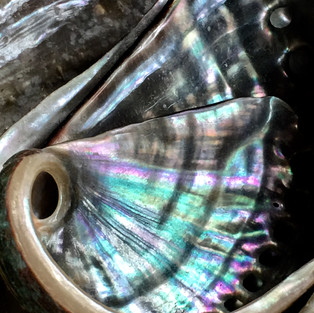Perlemoen, Schulphoek and Chinese Flying Money
- Lydia Schröder

- Mar 7, 2021
- 5 min read

‘John says the abalone poaching and the Cape drug trade are all part of the bigger wildlife trafficking problem,’ Anthon said, taking a sip from the glass of wine in his hand.
‘John?’ I asked, my mind on the golden fires flaring up at De Kelders, on the other side of Walker Bay, as the sinking sun reflected off the west facing houses’ windows. Much closer, the shacks at Schulphoek shone silver.
I picked a green olive from the bowl next to my own glass and popped it into my mouth.
‘John Grobler,’ Anthon replied, his concentration on the latest copy of The Village News, our weekly source of what’s happening in Hermanus.
‘The Namibian journalist? The one who exposed Hage Geingob’s friend and business associate Jack Huang?’
‘Yep,’ Anthon nodded. ‘He’s been investigating the link between abalone and other wildlife poaching, the SA drug trade and the Chinese for some time.’
It’s a perfect winter’s day in late June. After a week of stormy seas, the swells had receded into calm, undulating sighs. The silvery-grey water resembled the inside of a Cape abalone, or perlemoen, as we call it in Afrikaans.
We were sitting on our wooden deck, suspended above our own patch of fynbos. —My previous neighbour regarded this garden as a fire hazard. To him, a garden was something filled with exotic species, like a lawn. Or paved over. Ours was designed by nature, therefore it’s continuously redesigning itself.—
It was magic-hour. That time when sea merges with sky in a slow sensual tango till the Southern Cross materialised over the bay. The lighthouse at Danger Point fought to get its signal through the layer of fog rubbing out the horizon.
The last couple of days were Champagne-days, as my mother used to call these brilliant cerulean days.
‘See this soft layer of moisture on the outside of our glasses?’ she would comment as we sat down for lunch on the deck. ‘For it to be a Champagne-day, the moisture in the air must be sufficient to give a bottle of ice-cold wine this matt sheen.'
She would’ve enjoyed today. It was as if someone had switched the ambient light to vivid-mode, turning every colour into a near-fake flamboyant hue of itself.
‘He explains how the poachers are paid with cash or Tik and other drugs,’ Anthon continued. ‘As Tik can be sold for much more than the local cash value of the perlemoen, it’s the preferred method of payment. You must read the article. The reason why nobody ever gets caught…’
‘…is all those payments to corrupt officials and law enforcers all the way up to the top?’ I interjected, anger rising with my voice.
‘It’s more intricate than that,’ he answered, ‘although that’s part of the problem. They use an ancient payment system, called Chinese Flying Money, whereby the money never actually leaves China.’
‘So the money trail cannot be followed?’ he’d now awoken my interest.
‘Exactly,’ Anthon confirmed. ‘John writes here that the rich Chinese kingpins, living our side, restock their local money supply by undervaluing and under-declaring the goods they import from, and pay for, in China. Then they sell it for much more locally. That way obtaining the cash to pay the small guys and bribe officials. And ministers, of course. Ingenious.’
A flash of light flickered amongst the kelp.
‘They’re out again,’ I sighed.
‘They were dropped earlier, in full daylight…’ his voice matter-of-fact.
‘As always,’ I interjected.
‘… already dressed in their wetsuits. Same blue car. Yes, as always,’ Anthon got up to fill our wine glasses. The divers called out to each other, the Xhosa words bobbing on the harmless waves like a song.
‘I still find it interesting that one often sees police, or Overstrand vehicles, hanging around the lookout over the bay during the day, but for some reason, they’re never here when the guys get dropped or are in the water, like now,’ I fumed.
Five years ago we’d still have phoned the neighbourhood watch or Fauna and Flora. Until we were warned that the poaching gangs targeted the residents reporting them. Now it’s common knowledge that the poaching chain of command goes right up to the top. There’s nobody to report to anymore. Nobody seems to care. Our beautiful perlemoen will soon be extinct in the wild. My grandchildren will not understand why I compared the sea with the inside of an abalone shell. They’ll never have the privilege of encountering a wild rhinoceros in the deserts of Namibia either. All because a section of a destructive species, called Homo Sapiens, had created the fiction that eating abalone and rhino-horn enhances their virility. As if we need to enhance the ability of Sapiens to pro-create. An even larger section of Sapiens believes that Money has a value beyond that of a bartering system, that a person’s worth is measured by the size of his bank account. That money is worth more than the natural resources on the only known planet able to sustain man’s own species. Most profess they’re doing it for their children. How incredibly stupid.
‘According to John’s recent Vrye Weekblad article, the explosion of squatter camps we are seeing in our small coastal towns, like Hermanus, is directly related to the abalone and drug trade.’ Anthon folded the newspaper and turned his attention to the pearlescent bay, dissipating into the approaching night.
‘It’s like a gold rush. Everybody wants a part of the spoils.’
This small plot of earth is my root; used to be my root. I’ve known this place since I’ve been able to retain memories. My grandfather built a holiday cabin here; one of those which grew incrementally as funds became available. Over the years I’ve been uprooted many times. I’ve lived all over Southern Africa. I’ve learnt to pull up my roots at a moment’s notice. I’ve become a floating water plant. But I kept one anchor here, in this tiny bay called Sandbaai.
Last year, in October, the squatters moved onto the neighbouring piece of private land, called Schulphoek. They chopped down the 400-year-old Milkwood forest, —people are more important than trees, they professed,— and slashed and burned all through Christmas, renamed it Dubai City.
Early January, as an unseasonal North-Westerly reached hurricane strength, the fires got out of hand and our paradise turned into an inferno. Hell. When the orange smoke surrounded us, I cried. I, also, have no other home. I’m as part of this continent as perlemoen and rhinoceros. But I knew the time had come to pull up this root as well.
I felt Anthon’s arm around my shoulders. Together we looked over the serenity of the bay, ignoring the occasional flash of light from its depths.
‘Remember how the whales spent night after night right here in front of us, last spring?’ Anthon said, his voice reverberating in his chest, where my head nestled.
‘It was a mother with a calf,’ I recalled. ‘They kept on splashing the water with their flippers. The clapping sound hovered on the edge of my dreams the entire night.’
***
For more on John’s article, see the following:
www.thevillagenews.co.za issue: 26 June 2019 Multi-billion dollar trafficking exposed
www.vryeweekblad.com issue: 7 June 2019 Perlemoen en Rampokkerbedryf floreer in die tentakels van korrupsie
If you enjoy my writing, you might enjoy reading my book, ‘A yellow butterfly on an elephant’s foot.’
Available from www.amazon.com
More info and link on my website www.lydiaschroderauthor.com


_edited.png)









Comments